|
|
 |
|
| By Duckworks
Readers - all over the place
January |
 |
| Mystery Solved!

Jim Antrim's (San Francisco naval architect) weird
cat hits the waves. Read the San
Francisco Chronicle story.
submitted by Chris Ostlind
|
 |
|
Mystery Boat
I am trying to renovate the boat shown
(pictures above) and need to find either exact or
similar plans. Any help would be appreciated. You
can write me at: lowie1801@xtra.co.nz
Thanks.
Simon Lowe |
 |
| Sailplan now
included with Flapdoodle
plans
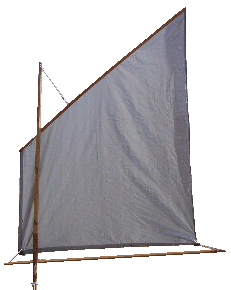 Hi
Chuck, Hi
Chuck,
I added a sail and rigging to the plans for the Flapdoodle
folding dinghy. The mast and mast socket had already
been added.
Please advise anyone with plans to check
for updates.
You can see the sail plan HERE:
Try to stay warm,
Bill Weller |
 |
| Report From
the North West School of Wooden Boatbuilding
Hi Chuck and Sandra,
I've begun my second year as a student at the North
West School of Wooden Boatbuilding, and look forward
to sending you occasional updates as we progress through
the year.
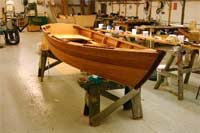 |
The Basic Boatbuilding
Skills students finished their three E.G. Monk-designed
flatties, and have turned out some beautiful
work. |
All three boats have already been sold,
a testament to the continuing popularity of Monk's
work.
| Although we've had some cold days
here in the Pacific Northwest, and gray days as
well, the scenery here at the school is always
wonderful to enjoy. |
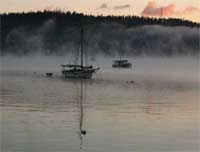
|
This year, the Traditional Small Boat
class in which I am a student will build two Grandy
skiffs under the direction of Instructor Tim Lee,
and a Whitehall under the combined direction of Instructors
Tim Lee and Ray Speck. We're also looking forward
to taking the lines off an older Whitehall as the
year progresses, and beginning basic repairs on that
boat.
The Traditional Large Craft Class, under the direction
of Instructor Rich Wilmore and assisted by Master
Boatbuilder Jeff Hammond, will continue work on the
Wilcox, a 35-foot motor-cruiser, and will build a
Haven-class sailboat.
And, the Contemporary Class, under the direction of
Bruce Blatchley, will build the third of the PT-15
sailboats (the subject of a recent profile in Wooden
Boat), as well as an additional boat.
On a separate note, the Basic Boatbuilding Skills
students each built their own wooden smoothing planes
and adjustment hammers, a project which is really
paying off now that we are honing our skills building
spruce oars. I'll bring you pictures and directions
in a future article.
Sincerely,
Pete Leenhouts
Student, North West School of Wooden Boatbuilding
Port Hadlock WA
https://www.nwboatschool.org/
|
 |
| A Swaggie
hits the Water
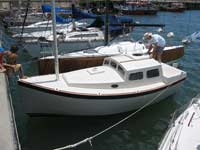 |
Had you seen this? It's Luis
Estevez' Swaggie. I'm pleased with the way the
little boat looks, for a little boat, I mean.
Check his website.
Thanks, John
|
|
 |
| The Canvas
Currach
Hi Chuck
Recently I bought a book and DVD from an Irish publisher
about building Currachs. The book is based on extracts
from the DVD and a set of lines is provided together
with the DVD.
 I
have to say this was one of the most enjoyable viewings
I’ve had for ages. It starts with a short local
history told by the builder and goes on to show the
whole thing from the choosing of wood, to the measuring
and building process. A very enlightening entertaining
and clear DVD. You just know you could go and build
one of these things by eye. I
have to say this was one of the most enjoyable viewings
I’ve had for ages. It starts with a short local
history told by the builder and goes on to show the
whole thing from the choosing of wood, to the measuring
and building process. A very enlightening entertaining
and clear DVD. You just know you could go and build
one of these things by eye.
Far be it from me to criticise design, but in my
view the build is rough and ready to put it mildly.
However when you see the finished product on the water
and winning a race, all you can say is. “This
is real non nonsense boat building. Very impressive!”
I’d recommend this to anyone interested in
skin on frame boats as you can sail these as well.
Get it from
https://www.galwayhookerassociation.ie/shipwrights.htm
Michael Birch
|
 |
| 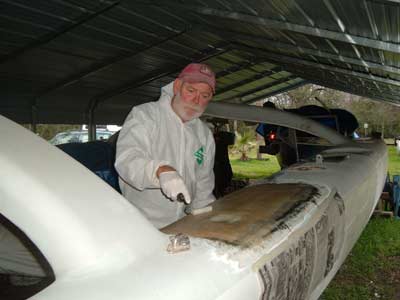
Roll, Roll, Roll
anothercoatofepoxyonto your boat.
Lee Martin working on his multihull.
|
 |
| Where the supplies
have ended up
Chuck & Sandra,
Thought I’d share a few pictures of where all
my great supplies from you guys have ended up. After
18 months of weekends, I launcher her Sunday on a
perfect day in Tampa Bay. She swam in a local lake
so we could introduce our selves to each other slowly.
S.E. wind at 15 knots with a high of 82 F. Could not
have been a more perfect day and she behaved like
a lady. The “Tiki” is birthed.
Thanks again for all the great service and supplies
and I’m sure I’ll be ordering more from
time to time.
Regards & Happy New Year,
Peyton Swan
|
 |
| Rot!!
I live in Thailand where the biggest
challenge is accessing the right tools and materials.
Not just because of a lack of availability, but because
of the huge differences in language, the written word
and attitudes. Several times I have asked for exterior
grade plywood, only
to be told by timber merchants that you can't build
boats from plywood (not surprising perhaps in a land
where the local boats are beautifully crafted from
delicious hardwoods).
I bought the best 6mm ply that I could
find, aware that it was not brilliant, and built a
little boat from free plans on the Net - from Hannu's
Boatyard. I launched it in July, and it has seen good
service helping to clear weeds from the farm pond.
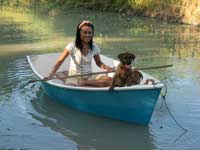 |
Here is my wife
and puppies in the little boat I built. |
I am now ready to start the next project
- Piccup
Pram. Last week I drove 9 hours each
way to Phuket to buy epoxy, and had bought fibreglass
tape in London when I was there in September. After
much fruitless searching I was tomorrow going to go
to the same merchant for plywood as I used before,
my wife is going away for a couple of
days and I was going to really get cracking.
But disaster! I today discovered that
the bottom of the little 6 month old boat is completely
rotten. Since the wet season ended a couple of months
ago it has been kept upturned outside, where the sun
is strong and the temperature around the mid 30s Centigrade
(around 95F).
Could it be the power of the sun alone?
Could it be the fact that I used oil based primer
with latex topcoats (won't do that again)? Could it
be that I coated the ply with polymer resin before
painting (OK I won't do that again either, it seemed
to do strange things to the ply)? Should I aerate
the farm pondwater more? Or was it that the plywood
was just awful and I have to start from scratch again
trying to find a decent supplier?
My first boat was really to test out
materials and my skills. I made some giant errors
but also was able to correct some of them and adapt
where shortages required it. And I was hooked! I have
an ever growing library of plans, with dreams of spending
my approaching retirement up to the elbows in sawdust
and epoxy, and sailing on the nearby lakes, rivers
and Gulf of Siam.
Comments PLEASE!
Deek
|
 |
| First Boat
While I sometimes wonder where the years
go, I don’t dwell on it too very much and am
grateful for the reminders of the more rewarding paths
that I have embarked upon thusfar. One of these reminders
that is still with me, is the first real boat that
I built. Pictured here, in for re-finishing is my
version of a Rushton, “Princess,” model,
sailing canoe in about its fourth iteration since
it was first built, over 30 years ago.
With an initial couple of very helpful suggestions
from my late father (along with his permission to
monopolize his garage) I started this project after
reviewing many old issues of the National Fisherman
newspaper, joining the International Marine book club
and purchasing dozens of boatbuilding books to eagerly
consume. Eventually my passion set my dreaming into
action. With all my enthusiasm (and then available
resources) I decided on this canoe model and with
the blissful ignorance of youth, felt fully qualified
to enlarge the design, make every bit of gear for
it, modify some second hand sails to fit it, and then
with no real sail training, I took to the bays and
lakes around my hometown.
| The first real
boat that I built, pictured here, in for re-finishing,
is my version of a Rushton, “Princess,”
model, sailing canoe. |
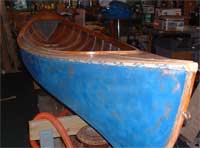
|
Luckily my instincts on the re-sizing of a design
worked out reasonably well. I had a fully decked sailing
canoe, LOA 17’- 10” Beam 42” and
a mid-ship depth including the coaming of 14”.
A sliding gunther rigged main and mizzen and a decent
self-tending jib, totaling about 125 square feet,
pushed this boat along nicely. Beginning it’s
life with water-tight bulkheads at about half the
canoe’s volume, originally a centerboard, then
a dagger-board, then lee-boards and now mainly used
for recreational rowing with a single stowable sailing
rig for use when desired, the boat has served me well
with these modifications to overall weight and ease
of use, closely following my diminished abilities
for those acrobatic feats of posterior positioning
once so easily accomplished.
Constructed of opposing layers of native white-cedar
strips, running diagonally from the keel to the gunwales,
(Ashcroft style), laminated with WEST System epoxy,
with three longitudinal strips of graphite fiber between
the layers of cedar on each side of the hull, spar
varnish and porch and floor enamel have protected
surfaces nicely, never having glassed anything. With
a bit of regular simple maintenance it looks like
this canoe could easily live through a couple more
generations of use. I will certainly try to send a
picture next time we’re on the water.
Don Freix
Fish Creek
|
 |
| Nessy's new
rowlocks
Chuck - I am sending you this picture
for two reasons. One is to show the shiny and lovely
Duckworks rowlocks
in place on Nessy when I went out today (December
23) on Chichester Harbour. The other is to brag about
being able to row more or less year-round here on
the south coast of England despite being at 51 degrees
North. It's not exactly the Caribbean, and the sun
barely heaves its lazy self over the horizon even
at midday but last week has been sunny, crisp and
cool.
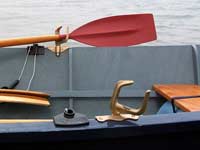 |
The shiny and
lovely Duckworks rowlocks in
place on Nessy |
The rowlocks enable me to use proper
feathering blades. Although Nessy will never be as
quick as my sliding seat skiff, the comfortable seating
position means I rest on my oars less often and the
higher oar position over the water means choppy conditions
are easier to cope with. In fact, I am really enjoying
returning to fixed seat rowing.
Chris Partridge
|
 |
| My Buddy caught
this 350 lb Tuna!
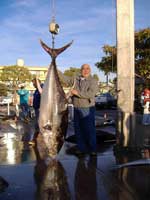 My
high school buddy, Curt Kamada, just got back from
his annual, long range fishing trip out of San Diego
and this is what he brought home. A 350 lb. Yellowfin
Tuna! It took Two hours to land this bad boy. Curt
was fishing 130 lb. test line at the time with the
World Record for Yellowfin on that rig at 382 lbs.
he's in pretty rare territory, indeed. My
high school buddy, Curt Kamada, just got back from
his annual, long range fishing trip out of San Diego
and this is what he brought home. A 350 lb. Yellowfin
Tuna! It took Two hours to land this bad boy. Curt
was fishing 130 lb. test line at the time with the
World Record for Yellowfin on that rig at 382 lbs.
he's in pretty rare territory, indeed.
Curt tells me the back of his truck was filled with
vacuum bagged tuna steaks and he had to start giving
them away to friends. For those who never go fishing
in the ocean... the Yellowfin is also called Ahi in
some circles. You may have seen that name on the menu
at a restaurant.
Here's the trip report: https://tinyurl.com/ymquc9
Chris Ostlind
|
|
| Transition
Dear friends of bill . I regret to inform
you that Bill passed away on December 1, 2006. I have
sent an attachment with this mail. Bill had a cerebral
hemorage and did not wake up. I am sorry I am not
a computer person otherwise I would talk to everyone
individually. regretfully starr pettit

|
 |
| Trackstick
proudly announces the Trackstick Pro
The Trackstick Pro is the latest and most innovative
GPS location recorder that is fully integrated into
Google Earth.
Telespial Systems is actively seeking distributors
and resellers who have want to offer their government
agency customers the latest in GPS technology. The
Trackstick Pro can improve productivity, manage assets
and be instrumental in a variety of disaster relief
efforts. Some of the numerous applications include:
evacuation route planning, search and rescue, property
surveying and emergency vehicle management. More information
on these uses can be found at https://www.trackstickpro.com/googlefederal.htm.
Trackstick Pro can offer your existing and prospective
customers a more efficient and cost effective tracking
device that will provide where their drivers have
been, start and stop times, driving route and more.
Please feel free to get more information at www.trackstickpro.com
Should you want to become a reseller of the Trackstick
Pro, please don't hesitate to contact me.
I look forward to your positive response.
Andy
818-287-8522
andy@trackstick.com
|
 |
|
|
|
|
|